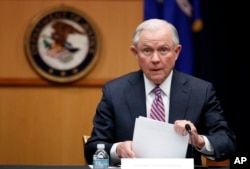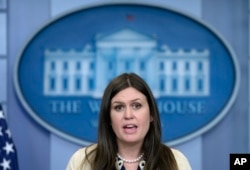Former colleagues of Deputy U.S. Attorney General Rod Rosenstein said Wednesday he should recuse himself from investigations into Russian meddling in U.S. elections and instead appoint a special prosecutor after President Donald Trump abrupt firing of FBI Director James Comey on Tuesday.
“Can he do an impartial job of the investigation? Perhaps. But the credibility is now lost and I don’t think the Department of Justice can conduct this investigation without hiring outside counsel,” said Doug Gansler, a former Maryland Attorney General who supported Rosenstein’s selection to the No. 2 post at Justice.
Rory Little, a former associate deputy attorney general who has known Rosenstein since the 1990s and also backed his nomination, said it is “entirely likely” Rosenstein will appoint a special prosecutor.
“If he appoints, he takes the heat off of himself and off of the Department of Justice,” Little said.
Rosenstein, who started on the job just two weeks ago, wrote a memo harshly critical of Comey that President Donald Trump and aides cited as justification for dismissing the FBI director.
The move ignited a political furor, with Democrats and other Trump critics suggesting that it was designed to impede the FBI’s investigation and questions about whether Trump’s campaign colluded with the Russians.
Trump has derided the notion as “fake news.”
Special prosecutor
Attorney General Jeff Sessions has already recused himself from involvement in the Russia probe after failing to disclose, during his Senate confirmation hearing, meetings with Sergei Kislyak, Russia's ambassador to Washington.
Rosenstein has the authority to name a special prosecutor if he chooses. During his own confirmation hearing in March, Rosenstein said would be willing to do so “whenever I determine it is appropriate.”
The White House opposes the idea. But Little said, “I know Rod Rosenstein well enough to know that if he thinks it’s the right thing to do and the president says, ‘If you do that, I’ll fire you,’ he’ll resign.”
Little and others have praised Rosenstein, a 52-year-old career prosecutor, for impartiality and independence. But his memo faulting Comey’s oversight of the FBI investigation into Hillary Clinton’s emails has raised new questions about partisanship.
In the three-page memo, Rosenstein said Comey was wrong to “usurp” the attorney general’s authority when he announced last July that Clinton would not face criminal charges over her use of a private email server and later held a press conference about his findings.
While Rosenstein carefully avoided calling for Comey’s dismissal, Trump said in a statement on Tuesday that he dismissed Comey “on the clear recommendations” of both Rosenstein and Sessions.
Impartiality
Sarah Huckabee Sanders, White House deputy press secretary, said Wednesday that Rosenstein and Sessions had raised concerns about Comey during a meeting with Trump on Monday and that Trump asked them to put their recommendations in writing.
The Washington Post reported that Trump directed Sessions and Rosenstein to make the case against Comey, and that Rosenstein later threatened to resign after the White House cast the president's dismissal of Comey largely on Rosenstein's recommendation.
Little said that while he did not think the memo compromised Rosenstein’s ability to conduct an independent investigation, it made political sense for him to recuse himself.
“I don’t know if Rosenstein will appoint a special counsel or not, but if he does, it’s actually a healthy move for the Department of Justice, because it takes the focus off the Department of Justice and puts it on the special counsel,” Little said.
John Hudak, an expert with the Brookings Institute in Washington, said any indication that Rosenstein wrote the memo to furnish Trump with a reason to fire Comey calls into question Rosenstein’s impartiality.
The allegations about Comey’s handling of the Clinton email server investigation were long known, raising questions about the timing of the FBI director’s dismissal. While Trump questioned Comey's July announcement not to bring charges against Clinton, he later praised the former FBI director for briefly reopening his investigation just days before the November 8 election.
“The president of the United States could have dismissed Director Comey on Jan. 20 as part of a normal transition,” Hudak said. “Instead, he waited until the (FBI) investigation into his campaign heated up.”
CNN reported on Monday that federal prosecutors have subpoenaed associates of former Trump National Security Adviser Michael Flynn as part of its Russia investigation.
The New York Times and The Washington Post each reported Tuesday that, shortly after Rosenstein was sworn in as the deputy attorney general, Comey had asked the Department of Justice for more resources for the Russia investigation.
The Department of Justice did not respond to a request for comment.
Gansler said it appears that the moment Trump “found out that Comey had escalated the investigation was the moment that he fired the very man investigating him.”
But Huckabee told reporters at the White House briefing that Trump had been contemplating firing Comey ever since the Nov. 8 election. “He wanted to give Director Comey a chance,” Huckabee said.
Little said that Comey’s firing may have slowed down the Russia investigation, but it’s unlikely to stop it.
“When Richard Nixon fired people who were getting close to Watergate, it simply intensified the focus on that investigation,” Little said. “I think that’s what you’re going to see here.”







